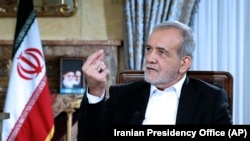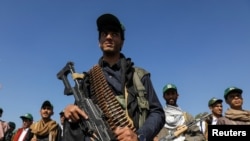UNITED NATIONS —
Yemen’s Houthi rebels have been transformed from a local armed group with limited capabilities to a powerful military organization with support from Iran, Iraqi armed groups, Lebanon’s Hezbollah militants and others, U.N. experts said in a new report.
The Iranian-backed Houthis have exploited the Israel-Hamas war in Gaza and worked to enhance their status in Iran’s self-described “Axis of Resistance” to gain popularity in the region and beyond, the experts monitoring sanctions against the Houthis said in the 537-page report to the U.N. Security Council.
To support Iranian-backed Hamas militants, whose surprise attacks in southern Israel on Oct. 7, 2023, sparked the war in Gaza, the Houthis have been attacking vessels in the Red Sea and the Gulf of Aden, disrupting global shipping in a key geopolitical area.
Despite Houthi claims that they would target ships linked to Israel, the panel said its investigations revealed the rebels have been targeting vessels indiscriminately.
Its analysis of data from the International Maritime Organization, the U.S. and the United Kingdom revealed that at least 134 attacks were carried out from Houthi-controlled areas against merchant and commercial vessels and U.S. and U.K. warships in the Red Sea and the Gulf of Aden between Nov. 15, 2023, and July 31, 2024.
“The group’s shift to actions at sea increased their influence in the region,” the U.N. experts said. “Such a scale of attacks, using weapon systems on civilian vessels, had never occurred since the Second World War.”
In their attacks, the experts said, the Houthis used a new and previously undisclosed ballistic missile, the Hatem-2.
The five-member U.N. panel includes experts on arms, finance, regional affairs, international humanitarian law and armed groups. The experts hail from India, Egypt, Switzerland, Belgium and Cabo Verde. Confidential sources told the panel that the Houthis are coordinating operations with al-Qaida in the Arabian Peninsula and strengthening ties to the al-Qaida-linked al-Shabab militant group in Somalia.
The Houthis have been engaged in a civil war with Yemen’s internationally recognized government, backed by a Saudi-led coalition, since 2014, when they took control of the capital Sanaa and most of the north. Hopes for peace talks to end the war vanished after the Oct. 7, 2023, attacks.
The U.N. experts said the Yemen conflict, which started as an internal fight and expanded into a regional confrontation, “has now escalated into a major international crisis.”
According to the experts, the number of Houthi fighters is estimated at 350,000 now, compared with 220,000 in 2022 and 30,000 in 2015.
“The panel observes the transformation of the Houthis from a localized armed group with limited capabilities to a powerful military organization, extending their operational capabilities well beyond the territories under their control,” the report said.
The experts said the transformation has been possible due to the transfer of military materiel and training provided by the Iranian Revolutionary Guard’s elite Quds Force, Hezbollah and Iraqi specialists and technicians.
Military experts, Yemeni officials and even officials close to the Houthis indicated that the rebel group couldn’t produce complex weapons systems such as ballistic missiles, cruise missiles, surveillance and attack drones, portable air defense systems, and thermal sights, which they have used without foreign support, the U.N. experts said.
“The scale, nature and extent of transfers of diverse military material and technology provided to the Houthis from external sources, including financial support and training of its combatants, is unprecedented,” the experts said.
The panel said it observed similarities between multiple military items used by the Houthis and those produced and operated by Iran or its allies in the Axis of Resistance, which includes Hezbollah and Hamas and armed groups in Iraq and Syria.
It said joint operations centers have been set up in Iraq and Lebanon with Houthi representatives “aimed at coordinating joint military actions of the Axis of Resistance.”
Inside Yemen, the panel said the Houthis have been intensifying military operations against the government. “The internal military situation is fragile, and any internal or external trigger could lead to the resumption of military confrontations,” it said.
The Houthis also have been recruiting large numbers of Yemeni youths and children as well as exploiting Ethiopian migrants, forcing them to join the fight against the government and engage in trafficking narcotics, it said.
“Exploiting high illiteracy rates, particularly in tribal areas, they have reportedly mobilized boys as young as 10 or 11, often despite parental opposition,” they said. “Recruitment sermons and weekly classes on jihad are reportedly delivered in schools.”
Child recruitment reportedly increased after the war in Gaza started and the U.S. and U.K. airstrikes in Yemen, the experts said. Yemen’s government said it received 3,298 reports of child recruitment in the first half of 2024, with youngsters reportedly used as human shields, spies and in combat — and for planting landmines and explosives, reconnaissance and as cooks.








